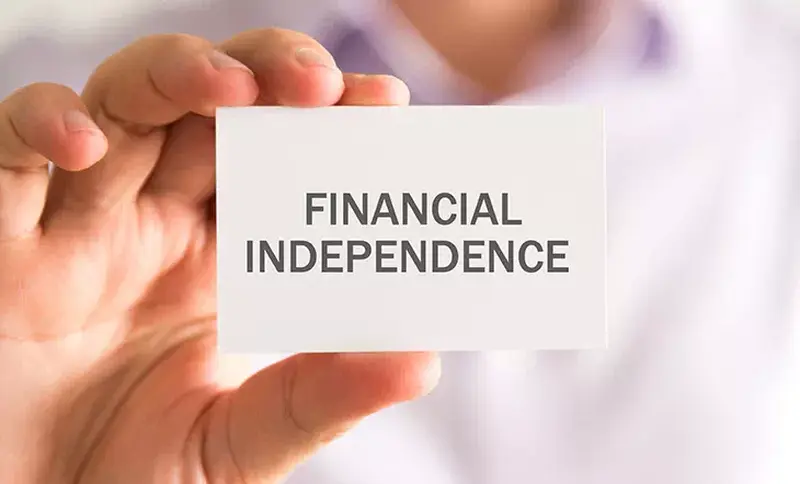
Financial independence is a goal that many individuals strive to achieve. It refers to the ability to live comfortably and sustainably without relying on a paycheck or external financial support. While the path to financial independence may seem daunting, it is attainable with the right strategies and mindset.
In this article, we will explore nine practical tips that can help you on your journey towards financial independence.
1. Set Clear Financial Goals

Establishing clear financial goals is the first critical step towards achieving financial independence. This process involves identifying what you wish to accomplish financially in the short-term, medium-term, and long-term.
Your goals could range from paying off student debt, buying a home, investing in promising stocks, planning for retirement, or even saving for a dream holiday.
It is essential to make your goals S.M.A.R.T — Specific, Measurable, Attainable, Relevant, and Time-bound. By creating well-defined and quantifiable financial goals, you can track your progress over time and adjust your strategies as necessary, making the path towards financial independence clear and achievable.
2. Minimise Debt and Interest Payments
Minimising debt and interest payments is a critical component on the path to financial independence. It’s easy to get trapped in a vicious cycle of borrowing and accruing interest, particularly on debts such as credit card bills, cash loans, payday loans, or line of credit from direct lender like Drafty.
To break this cycle, prioritise paying off your highest interest debts first, a strategy often referred to as the ‘avalanche method’. If you have several sources of debt, consider debt consolidation to simplify your payments and potentially lower your interest rate.
Remember, each payment you make towards reducing your debt is a step closer to financial freedom. Aim to stay out of unnecessary debt in the future, and remember that not all debt is bad – strategic borrowing for investments such as education or real estate can contribute to your long-term financial growth.
3. Create a Budget and Stick to It

Creating a budget and sticking to it is an essential step on your journey to financial independence. A budget serves as a financial blueprint, helping you manage your income, expenditures, and savings effectively.
Begin by assessing your monthly income and identifying all sources of expenses, including rent or mortgage, utilities, groceries, transport, entertainment, and any outstanding debts.
Once you’ve got a clear picture of your cash flow, allocate specific amounts to each category, and aim to spend only the designated amount. This might involve cutting back on non-essential items or finding ways to increase your income.
Be sure to include a savings category in your budget, even if it’s a small amount to start with.
4. Save and Invest Wisely
Saving and investing are key components of achieving financial independence. Start by building an emergency fund that covers at least three to six months of living expenses. This fund acts as a safety net during unexpected financial challenges.
Additionally, explore different investment options that align with your risk tolerance and financial goals. Consider diversifying your investments to minimise risk and maximise potential returns.
5. Increase Your Income

Increasing your income can accelerate your journey towards financial independence. Look for opportunities to boost your earning potential, such as pursuing additional education or certifications, taking on side gigs or freelance work, or seeking promotions and salary raises.
By increasing your income, you can allocate more resources towards savings and investments, ultimately speeding up your progress.
6. Live Below Your Means
Living below your means is another pivotal strategy for achieving financial independence. This practice involves spending less than you earn and saving the difference. It doesn’t necessarily mean denying yourself enjoyment or a comfortable lifestyle; instead, it’s about making thoughtful and intentional decisions about your spending.
Focus on distinguishing between your ‘wants’ and ‘needs’, and try to minimise expenses in the ‘wants’ category. It can also be beneficial to adopt frugal habits, such as preparing meals at home, using public transport, or buying items second-hand.
The money saved from living below your means can be directed towards debt repayment, savings, or investments, helping you to reach your financial goals sooner.
Remember that the key is consistency – small savings accumulated over a long period can add up to significant amounts.
7. Continuously Educate Yourself

Financial literacy is essential for making informed decisions about your money. Continuously educate yourself about personal finance, investment strategies, and money management techniques.
Stay updated on financial news and trends to make well-informed choices. Consider reading books, attending seminars, or following reputable financial experts to expand your knowledge and improve your financial decision-making skills.
8. Plan for Retirement
Planning for retirement is a crucial aspect of achieving financial independence. Start saving for retirement as early as possible to take advantage of compounding interest. Contribute to retirement accounts such as a workplace pension or individual retirement accounts (IRAs).
Regularly review and adjust your retirement plan to ensure that you are on track to meet your financial goals.
9. Seek Professional Advice

Seeking professional advice can provide valuable insights and guidance on your journey towards financial independence. Consider consulting with a financial advisor or planner who can help you develop a personalised financial plan based on your goals and circumstances.
They can provide expertise in areas such as investment strategies, tax planning, and risk management, helping you make informed decisions and optimise your financial resources.
Conclusion
Achieving financial independence requires discipline, planning, and a long-term perspective. By setting clear goals, creating a budget, minimizing debt, saving, and investing wisely, increasing your income, living below your means, continuously educating yourself, planning for retirement, and seeking professional advice, you can take significant steps towards financial independence.
Remember, it is a journey that requires patience and perseverance, but the rewards of financial freedom are well worth the effort.
Start implementing these practical tips today and pave your way towards a financially independent future.
FAQs

What is the ‘avalanche method’ for debt repayment?
The ‘avalanche method’ involves paying off your debts starting with the one with the highest interest rate first, while making minimum payments on your other debts.
How can I differentiate between ‘wants’ and ‘needs’ when budgeting?
‘Needs’ are essential expenses for living, such as rent, food, and utilities. ‘Wants’ are non-essential items like entertainment, eating out, and luxury goods.
What is a good starting point for building an emergency fund?
Aim to start with at least three to six months’ worth of living expenses as an emergency fund. This provides a financial buffer in case of unexpected costs or loss of income.









